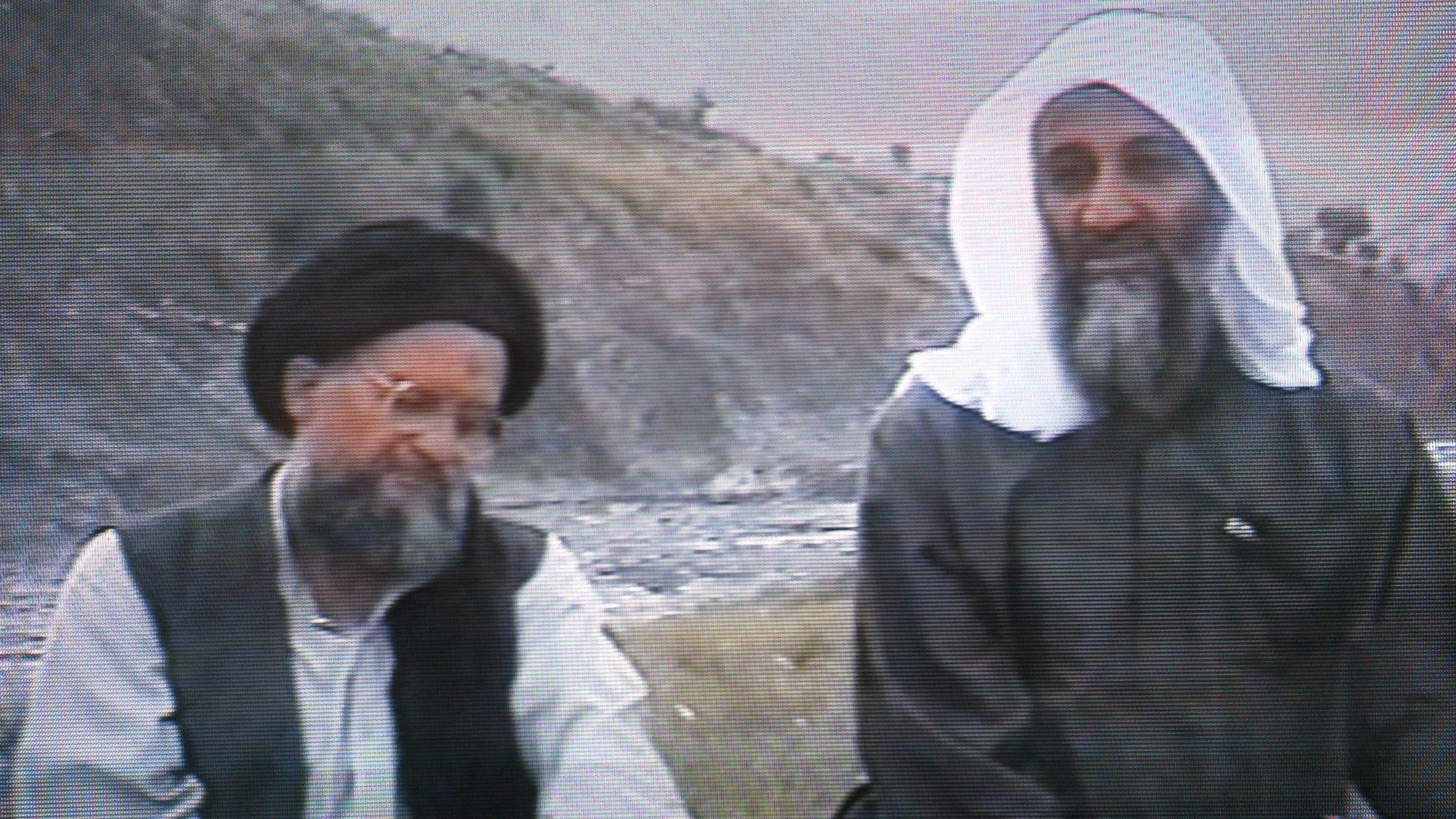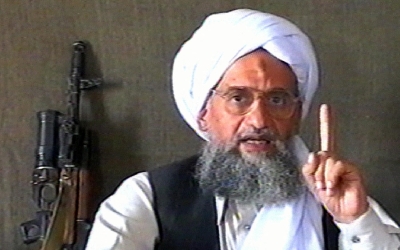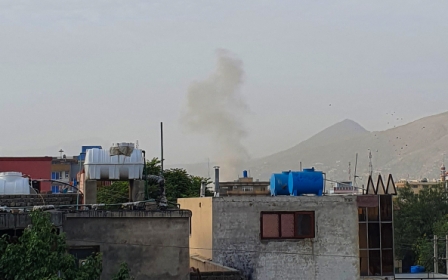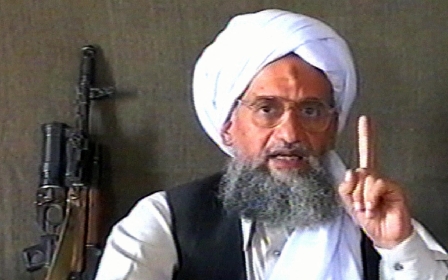What's next for al-Qaeda after killing of Ayman al-Zawahiri?

The man described as the ideological brains behind al-Qaeda, Ayman al-Zawahiri, was killed in a US drone strike, leaving the militant group leaderless and in a strategic quandary.
Zawahiri, successor to former leader Osama bin Laden since 2011, was killed by a CIA drone strike in Kabul on Sunday morning.
It followed several months of monitoring and planning, after American intelligence identified his safe house in the Afghan capital, Kabul, earlier this year.
“It's more a symbolic than operational blow, since al-Qaeda franchises mostly take their own decisions on a day-to-day basis,” Jerome Drevon, an analyst at The International Crisis Group, tells Middle East Eye.
The 71-year-old slain militant was thought to be seriously ill, with most responsibilities delegated to others within the hierarchy.
New MEE newsletter: Jerusalem Dispatch
Sign up to get the latest insights and analysis on Israel-Palestine, alongside Turkey Unpacked and other MEE newsletters
The Egyptian-born physician was less charismatic and effective than his predecessor bin Laden, overseeing a number of splits in the group and a decline in influence following the rise of the Islamic State group.
But the loss of his vast global networks and his long-held status within the organisation are likely to deal a significant blow, as questions now turn to succession.
“Naming a new leader will be very difficult because nobody else really has the same stature within the group, the same experience, and connection to militants worldwide,” says Drevon, who recently wrote a book on militant groups in Egypt.
“Finding a new consensual figure that could be accepted by the group's prominent leaders and commanders will pose a real issue.”
Will the new leader be based in Iran?
A United Nations Security Council report published last month on al-Qaeda and the Islamic State group listed four potential successors to Zawahiri.
First up, and widely considered the most likely new leader, is the group’s second in command, Saif al-Adel.
The 62-year-old is a former Egyptian military officer, who went on to join al-Qaeda and become bin Laden’s security chief.
Adel has been wanted by the FBI since 2001 in connection to the 1998 bombings of US embassies in Tanzania and Kenya. He currently heads up al-Qaeda's military planning.
'The key question is: from where would Saif al-Adel operate? From Iran, Afghanistan, Africa, or somewhere else?'
- Khalil al-Anani, senior fellow
“Saif al-Adel is the likely successor of Zawahiri and he might take over the organisation in the coming weeks or months,” Khalil al-Anani, an academic and senior fellow at the Arab Center Washington DC, tells MEE.
“If that happens, most of the al-Qaeda branches will pledge allegiance to him, given his history with the organisation and the stature he has within the jihadi circles.”
The next strongest candidate is Abd al-Rahman al-Maghribi, the Moroccan-born head of al-Qaeda’s media operations.
Maghribi, who trained as a computer engineer, is Zawahiri’s son-in-law.
He and Adel would face the same stumbling block if they are to take the helm of the militant network: both are reportedly based in Iran.
“The key question is: from where would Adel operate? From Iran, Afghanistan, Africa, or somewhere else? This is yet to be seen,” notes Anani.
Drevon states that their location “might lead to accusations that [Adel and Maghribi] cannot take independent decisions and that Iran is using them”.
A move by al-Qaeda to appoint an Iran-based leader would add another layer of tensions between Washington and Tehran, amid stalled nuclear negotiations.
Al-Qaeda’s former second in command, Abu Muhammad al-Masri, was secretly killed in Tehran in 2020 by Israeli operatives at the behest of Washington, according to intelligence officials. The assassination was not publicly acknowledged by the US, Iran or Israel.
In recent years, a number of nuclear scientists have been killed in Iran too, allegedly at the hands of Israel. Drevon believes a similar approach may be taken if al-Qaeda’s new leader is based in the Islamic Republic.
“Many assassinations have targeted individuals associated with Iran's nuclear programme, so similar assassinations would clearly be expected in that case.”
Local versus global aims
The two other names cited in the UN report are leaders of al-Qaeda affiliate groups in the region.
One is Yazid Mebrak, an Algerian citizen who heads up al-Qaeda in the Islamic Maghreb (AQIM).
Mebrak pledged allegiance to Zawahiri upon taking up his role in 2020, and is believed to play an active role in the management of the global umbrella group.
The other candidate is Ahmed Diriye, emir of the Somali militant group, al-Shabaab, which announced a merger with al-Qaeda in 2012.
Zawahiri has since strengthened ties with the affiliate organisation, which has contributed millions of dollars to al-Qaeda’s central treasury.
'Al-Qaeda does not currently have the ability to perpetrate large scale attacks in western countries, nor the intention'
- Jerome Drevon, analyst
Drevon cautions that it remains unclear whether affiliate leaders would be “accepted by one another” as the global head.
Such a promotion for a regional chief would cement al-Qaeda's pivot from focusing on major attacks on the West to consolidating localised strongholds.
“The traditional al-Qaeda organisation and network is to a large extent dismantled and decimated,” says Anani.
“Therefore, any response or retaliation for Zawahiri's killing might come from either the branches, particularly in Africa, or through lone wolf attacks against the US interests and personnel around in the US or beyond.”
The group has not coordinated an attack in Europe or North America for over a decade, though some assailants in that time are thought to have been al-Qaeda inspired - including a Saudi military officer who killed three American sailors in 2019, and a knife-wielding attacker in London Bridge later that year.
“Al-Qaeda does not currently have the ability to perpetrate large-scale attacks in western countries, nor the intention,” Drevon adds.
“The group has shifted its focus to more local issues, and I don't think it will change in the near future.”
Middle East Eye delivers independent and unrivalled coverage and analysis of the Middle East, North Africa and beyond. To learn more about republishing this content and the associated fees, please fill out this form. More about MEE can be found here.





